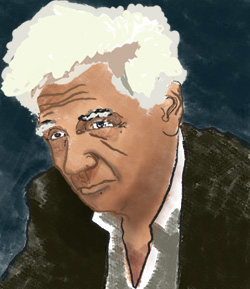Źródło: Structure, sign and play in the discourse of the human science w: Alan Sokal, Jean Bricmont, Modne bzdury. O nadużywaniu pojęć z zakresu nauk ścisłych przez postmodernistycznych intelektualistów, tłum. Piotr Amsterdamski.
Jacques Derrida słynne cytaty
„Dzisiaj ofiara Abrahama zostałaby zinterpretowana jako zbrodnia.”
Źródło: The Gift of Death, University of Chicago Press, Chicago 1996
Źródło: Głos i fenomen. Wprowadzenie do problematyki znaku w fenomenologii Husserla, KR, Warszawa 1997, s. 74, tłum. Bogdan Banasiak.
Źródło: La loi du genre, Parages, Paryż 1986, s. 264, cyt. za: „Przekładaniec”, numer 22–23, Wydawnictwo UJ, 2010, s. 38.
Jacques Derrida: Cytaty po angielsku
Cogito and The History of Madness, p.37 (Routledge classics edition)
Writing and Difference (1978)
Cogito and The History of Madness (Routledge classics edition)
Writing and Difference (1978)
"The Ends of Man," Margins of Philosophy, tr. w/ notes by Alan Bass. The University of Chicago Press. Chicago, 1982. (original French published in Paris, 1972, as Marges de la philosophie). p. 116
Specters of Marx (1993), 1970s
Plato's Pharmacy, intro
Dissemination (1972)
Force and Signification
Writing and Difference (1978)
Plato's Pharmacy
Dissemination (1972)
Derrida (2003 documentary), referring to his personal library
Specters of Marx (1993), 2000s
We have heard this and we will hear it again.
Injunctions of Marx
Specters of Marx (1993)
“I am one of those marranes who no longer say they are Jews even in the secret of their own hearts.”
"Circumfession." In Jacques Derrida, eds. G. Bennington & J. Derrida, trans. G. Bennington. Chicago: University of Chicago Press, 1993, p. 170
The animal looks at us, and we are naked before it. Thinking perhaps begins there.
Specters of Marx (1993), The Animal That Therefore I Am, 1997
"The Ends of Man," Margins of Philosophy, tr. w/ notes by Alan Bass. The University of Chicago Press. Chicago, 1982. (original French published in Paris, 1972, as Marges de la philosophie). p. 123
“Circumcision, that’s all I’ve ever talked about.”
"Circumfession." In Jacques Derrida, eds. G. Bennington & J. Derrida, trans. G. Bennington. Chicago: University of Chicago Press, 1993, p. 70
Plato's Pharmacy, Pharmacia
Dissemination (1972)
Cogito and The History of Madness, p.37 (Routledge classics edition)
Writing and Difference (1978)
Force and Signification
Writing and Difference (1978)
